Donald Trump has been rightly criticized for his denunciations of the U.S. intelligence community. His recent comment likening its analyses to Nazi behavior was particularly regrettable. But it is time to take a deep breath, and start to repair the damage. This is not the first time that there have been serious rifts between U.S. intelligence professionals and their commander in chief. And in fairness to Mr. Trump, it is not all his fault.
The president-elect’s problems began when he was chastised for not showing much interest in the presidential daily brief. To be sure, like all of us, Mr. Trump has lots to learn about the world. The intelligence community, with its many experts and capacity for crisp, cogent presentation of findings, can help him do so. But there is no reason to presume that a daily litany of updates, presented in a traditional and formal way, makes the best use of a president-elect’s time. It is too bad that Mr. Trump did not request other types of briefings, such as “deep dives” of a couple hours each on the five or 10 biggest national security challenges facing the country. One hopes that he will still pursue such an approach in the early weeks of his presidency. However, there is nothing sacrosanct about the presidential daily brief; President Obama, for example, took briefings far less frequently than his predecessor, George W. Bush.
Whatever the ruckus over the presidential daily brief issue, things got much worse in December with the intelligence community’s release of its findings that Russia had interfered in the U.S. elections, with the twin aims of weakening Hillary Clinton and if possible helping Mr. Trump defeat her. The case that the Russians had hacked the Democratic National Committee and provided that information to Wikileaks appears rock solid. Yet the means by which the information was released—briefings to the current president, the president-elect, and members of Congress from both sides of the aisle, but without a public news conference—meant that the findings were immediately processed through partisan prisms. If the intelligence community had given its own briefing—highly unusual, but not unprecedented—or even released a clear one-page summary of its main findings for the public, the news coverage of this report could have been managed much better.
Thus, initially at least, only one part of a two-part analysis received proper emphasis. The first part was crystal clear; Russia had indeed interfered in American democracy. However, the second was muddled: The assessment that there was no basis for believing Russian interference had swayed the election was lost in the noise, or associated with Trump partisans rather than objective analysis. The president-elect somewhat peevishly, but also somewhat understandably, then assumed that the very legitimacy of his victory was being challenged. Since the intelligence community provided the analysis that led to this outcome, Trump wondered if they had engineered this distorted message on purpose.
And now, things are even worse. The dossier on Donald Trump assembled by a British investigator from information purportedly collected by Moscow, was given greater standing and legitimacy by the U.S. intelligence community who briefed it to Obama, Trump, and eight key members of Congress. Then someone apparently then leaked it, along with all of its damning tabloid-like information about the supposed hiring of prostitutes and other illicit activities by America’s 45th president.
The intelligence community was apparently worried that such information in the hands of Moscow could create leverage against Trump—because he would be so fearful of having his character impugned with its tawdry contents that he could be subject to blackmail. But, having studied the dossier for several months, the intelligence community was unable to confirm any of the information it contained. Alas, now the information (true or not) has been preemptively released for all the world to see—and Trump has been preemptively penalized by his own fellow Americans, without Moscow needing to lift a finger.
We have no doubt that the leak arose outside the intelligence community. We also have no doubt that the intelligence community followed standard, time-tested procedures for briefing such sensitive information only to the few members of the House and Senate and executive branch (and executive branch in waiting) that would normally have access to such high matters of state. But one can also argue that the intelligence community should have anticipated a leak in this case, that it alerted too many people to have any great hope of keeping the matter quiet—and that, in any event, Mr. Trump would surely blame it for deliberate denigration of his victory and his ensuing presidency.
Little wonder things are so bad.
But the path to recovery is also evident. First, even those who find Mr. Trump’s behavior and words highly unfortunate on matters of national security, as we often do, should consider reinterpreting events of recent weeks in a way that assigns at least some fraction of the blame to the intelligence community itself. The analysts are not at fault, and their leaders were not motivated by partisan politics—but just the same, the way the process has intersected with America’s political debate has been very regrettable.
Second, we are turning over a new leaf as a nation. The transitions from Director Brennan to Director Pompeo and from Admiral Clapper to Senator Coats will replace two accomplished Americans, who are nevertheless now closely associated with President Obama, with two fresh faces who also understand very well how the American intelligence system works. Because they know that the CIA, Defense Intelligence Agency, National Security Agency, Office of the Director of National Intelligence, and a dozen other intelligence agencies are staffed almost exclusively with career professionals, they are likely to get to work to repair many of the wounds within the intelligence community itself.
Of course, Mr. Trump needs a fresh start on this subject, too. He could have handled the disagreements of recent weeks far more charitably, recognizing the quality and dedication of the tens of thousands of Americans who work in the intelligence community to keep this country safe. He and General Flynn can and should encourage rethinking of how the intelligence community is structured, budgeted, and led. But it is also now time to lead such a process of creative disruption with the kind of comportment that the nation rightly expects of its commander in chief.
The breach between the intelligence community and the new American president can be fixed. But it’s time to get on with it. We may not have much time before the next national security crisis. We need to be ready when North Korea tests another nuclear weapon or intercontinental ballistic missile, when China fires on another fishing vessel, when Russia bombs another Syrian town, when Iran continues its nefarious activities in Iraq—or all of the above, and then some. Whatever the nation’s partisan divides, the president and international community need to work as a team if this nation is to remain secure.
The Brookings Institution is committed to quality, independence, and impact.
We are supported by a diverse array of funders. In line with our values and policies, each Brookings publication represents the sole views of its author(s).

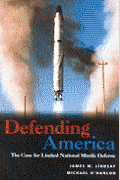


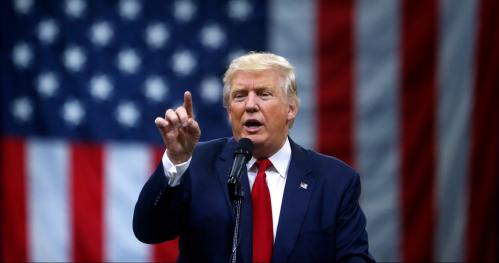
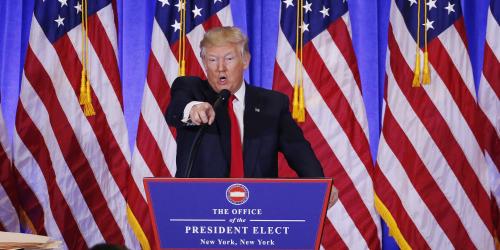
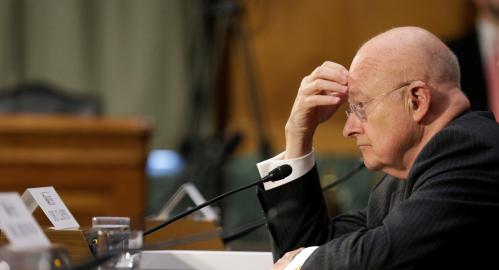



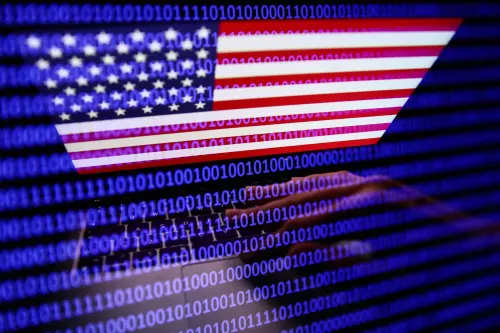
Commentary
The intelligence community and President Trump
January 19, 2017